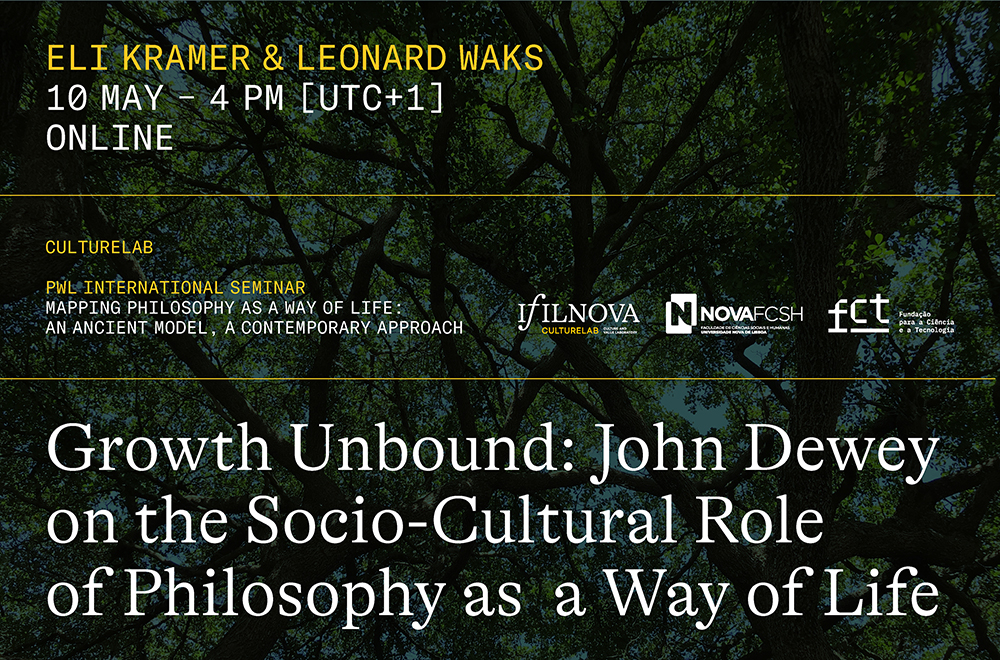Eli Kramer & Leonard Waks

10 May | 4 PM (UTC+1)
11 AM New York
12 AM Brasilia
4 PM Lisbon
5 PM Central Europe
For other locations click here.
Abstract
A common critique of philosophy as a way of life (PWL) as a historic, connected collection of traditions is that they focus too much on individual self-cultivation at the expense of socio-cultural reform. On one hand it is easy to show that many of these traditions across the globe, and especially the Stoics and Confucians, envisioned and carried out projects of socio-cultural reconstruction as part of their practice. On the other hand, there is a largely undeveloped articulation of what the equivalent of spiritual exercises of the individual are at the social-cultural level.
In this presentation we seek to show that John Dewey (1859-1952) has a unique contribution to offer here: his account, and attempts to put into practice, a PWL oriented approach to reconstruct our modes of human association so as to untap the power of individuals-in-community. Dewey sought to highlight a series of connected experiments (e.g. schools, artistic communities, and institutions of higher learning) within the Western PWL tradition that worked to coordinate human social relations in such a way to untap/empower flourishing individuals that in turn could be empowered members of their communities. It is such communities and individuals that he thought were best able to help us address the complex problems of life. He provides us the groundwork to talk about the symbiotic relationship between self-cultivation through spiritual exercises and social- reconstruction through enriching modes of humane association.
Bio
Eli Kramer is an Associate Professor (Profesor Uczelni) at the Institute of Philosophy of the University of Wrocław. He specialises in metaphilosophy (in particular, philosophy as a way of life), intercultural philosophy, philosophy of culture, German and American Idealism, Classical American Philosophy, and Process Philosophy. Alongside Matthew Sharpe and Michael Chase, he co-edits the Brill book series, “Philosophy as a Way of Life: Text and Studies”. His first single authored monograph is on the nature and role of the associated philosophical life (as distinct from philosophy as a discipline): Intercultural Modes of Philosophy, Volume One: Principles to Guide Philosophical Community (Brill, 2021). He has also co-edited and contributed to collections such as Philosophy of Culture as Theory, Method, and Way of Life: Contemporary Reflections and Applications (Brill, 2022), Rorty and Beyond (Lexington Books, 2020), and Contemporary Philosophical Proposals for the University: Toward a Philosophy of Higher Education (Palgrave Macmillan, 2018).
Leonard J. Waks is Professor Emeritus of Educational Leadership at Temple University, USA. He was Distinguished Professor of Educational Studies at Hangzhou Normal University from 2018-2021. Waks is the author of Education 2.0: The LearningWeb Revolution and the Transformation of the School (Paradigm, 2013), and The Evolution and Evaluation of Massive Open Online Courses: MOOCs in Motion (Palgrave, 2016), as well as numerous scholarly articles and book chapters. He is a past president of the John Dewey Society, and has been awarded the Dewey Society’s Lifetime Achievement Award. He is founding editor of the journal Dewey Studies.
Registration required via email to mapping.pwl@gmail.com.
Lucas Nascimento Machado
Life Beyond Capitalism: An Attempt at an Interlocution Between Hadot, Foucault and Byung-Chul Han

